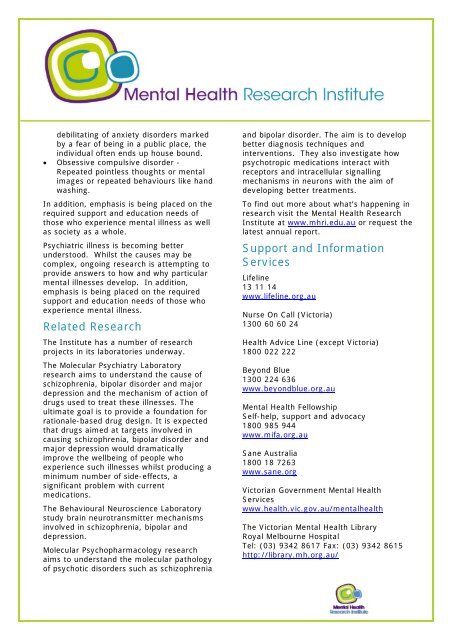Fact Sheet: Psychiatric illness - Mental Health Research Institute
Fact Sheet: Psychiatric illness - Mental Health Research Institute
Fact Sheet: Psychiatric illness - Mental Health Research Institute
Create successful ePaper yourself
Turn your PDF publications into a flip-book with our unique Google optimized e-Paper software.
debilitating of anxiety disorders marked<br />
by a fear of being in a public place, the<br />
individual often ends up house bound.<br />
Obsessive compulsive disorder -<br />
Repeated pointless thoughts or mental<br />
images or repeated behaviours like hand<br />
washing.<br />
In addition, emphasis is being placed on the<br />
required support and education needs of<br />
those who experience mental <strong>illness</strong> as well<br />
as society as a whole.<br />
<strong>Psychiatric</strong> <strong>illness</strong> is becoming better<br />
understood. Whilst the causes may be<br />
complex, ongoing research is attempting to<br />
provide answers to how and why particular<br />
mental <strong>illness</strong>es develop. In addition,<br />
emphasis is being placed on the required<br />
support and education needs of those who<br />
experience mental <strong>illness</strong>.<br />
Related <strong>Research</strong><br />
The <strong>Institute</strong> has a number of research<br />
projects in its laboratories underway.<br />
The Molecular Psychiatry Laboratory<br />
research aims to understand the cause of<br />
schizophrenia, bipolar disorder and major<br />
depression and the mechanism of action of<br />
drugs used to treat these <strong>illness</strong>es. The<br />
ultimate goal is to provide a foundation for<br />
rationale-based drug design. It is expected<br />
that drugs aimed at targets involved in<br />
causing schizophrenia, bipolar disorder and<br />
major depression would dramatically<br />
improve the wellbeing of people who<br />
experience such <strong>illness</strong>es whilst producing a<br />
minimum number of side-effects, a<br />
significant problem with current<br />
medications.<br />
The Behavioural Neuroscience Laboratory<br />
study brain neurotransmitter mechanisms<br />
involved in schizophrenia, bipolar and<br />
depression.<br />
Molecular Psychopharmacology research<br />
aims to understand the molecular pathology<br />
of psychotic disorders such as schizophrenia<br />
and bipolar disorder. The aim is to develop<br />
better diagnosis techniques and<br />
interventions. They also investigate how<br />
psychotropic medications interact with<br />
receptors and intracellular signalling<br />
mechanisms in neurons with the aim of<br />
developing better treatments.<br />
To find out more about what’s happening in<br />
research visit the <strong>Mental</strong> <strong>Health</strong> <strong>Research</strong><br />
<strong>Institute</strong> at www.mhri.edu.au or request the<br />
latest annual report.<br />
Support and Information<br />
Services<br />
Lifeline<br />
13 11 14<br />
www.lifeline.org.au<br />
Nurse On Call (Victoria)<br />
1300 60 60 24<br />
<strong>Health</strong> Advice Line (except Victoria)<br />
1800 022 222<br />
Beyond Blue<br />
1300 224 636<br />
www.beyondblue.org.au<br />
<strong>Mental</strong> <strong>Health</strong> Fellowship<br />
Self-help, support and advocacy<br />
1800 985 944<br />
www.mifa.org.au<br />
Sane Australia<br />
1800 18 7263<br />
www.sane.org<br />
Victorian Government <strong>Mental</strong> <strong>Health</strong><br />
Services<br />
www.health.vic.gov.au/mentalhealth<br />
The Victorian <strong>Mental</strong> <strong>Health</strong> Library<br />
Royal Melbourne Hospital<br />
Tel: (03) 9342 8617 Fax: (03) 9342 8615<br />
http://library.mh.org.au/













